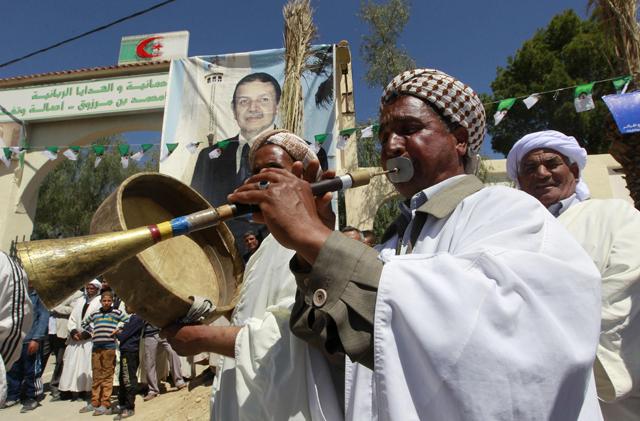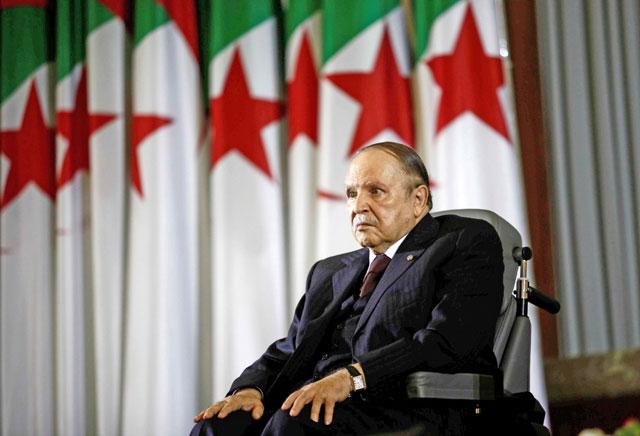You are here
Algeria business greases wheels of Bouteflika campaign
By AFP - Apr 12,2014 - Last updated at Apr 12,2014

ALGIERS — Long held in suspicion in a largely state-controlled economy, Algerian businessmen are pouring cash into President Abdel Aziz Bouteflika’s re-election campaign, hoping to benefit from an expected fourth term for the incumbent.
By law, candidates are supposed to spend no more than $764,000 (600,000 euros) on their campaign unless the election goes to a second-round run-off.
But analysts say the legal limit is set impossibly low for a country which is Africa’s largest by area, paving the way for effectively unrestricted spending by the candidates, with the incumbent leading the way.
Because the spending is technically illegal, no public record is kept of where the campaign funds come from.
But there is no shortage of businessmen eager to smooth the way for public contracts, or cut through Algeria’s notorious red tape to secure loans from state-owned banks or planning permission from local authorities.
According to economist M’Hamed Hamidouche, the legal spending limit would not even cover the costs of renting the campaign booths the rival candidates set up.
“In reality, the candidates receive significant donations in cash, the origins of which are difficult to establish. There are no checks,” Hamidouche said.
Bouteflika’s campaign spending alone runs to at least 75 million euros, Algerian press reports say.
A team of top aides, led by former prime minister Abdel Malek Sellal, have been separately criss-crossing the vast North African nation to make the controversial case for the incumbent’s re-election as the 77-year-old is too sick to campaign himself.
First and foremost among his campaign contributors are the many businessmen dependent on public sector contracts in an economy driven by state-controlled oil and gas receipts, Hamidouche says.
Prominent among them is Ali Haddad, who is often seen with the ageing president’s brother Said.
His ETRHB construction company has experienced meteoric success in the 15 years since Bouteflika came to power, securing state contracts worth an estimated $2.5 billion, according to the Algerian press.
Haddad, who already runs the pro-Bouteflika Dzair TV, has launched a new channel, Wiam, dedicated to covering the incumbent’s re-election campaign.
Since stepping down as premier in March, Bouteflika’s campaign chief Sellal has shuttled around the country in a plane chartered from state energy firm Sonatrach’s Tassili Airlines, accompanied by some 50 invited journalists.
The president’s main rival, Ali Benflis, who is seeking to oust Bouteflika at the second attempt after failing 10 years ago, has chartered an aircraft from state-owned carrier Air Algerie.
Businessmen
‘invited’ to donate
Businessmen in the services sector who have flourished during Bouteflika’s rule are another source of campaign funding, Hamidouche says.
Mahieddine Tahkout was a humble fruit and vegetable trader but now owns a fleet of buses which operate under contract to the higher education ministry, and also holds the distribution licences for several Asian and European car manufacturers.
There are also many other businessmen who may not be seeking state contracts but who are still eager for support from the president’s entourage in navigating Algeria’s bureaucracy.
Algeria’s main employers’ organisation, the Forum of Business Leaders (FCE), voted at a special meeting in March to support Bouteflika’s re-election.
Several FCE members said they were “invited” to make pledges of between 5,000 euros and 500,000 euros to Bouteflika’s campaign, according to the news website Maghreb Emergent.
One member, food business boss Slim Othmani, charged that “threats” were made to extract donations from reluctant contributors.
“I have to choose my words carefully when I talk about threats, because some of us are getting seriously worried,” he said in remarks that were later leaked.
Othmani quit the FCE shortly afterwards, complaining in his resignation letter that an employers’ organisation ought to show more self-respect than to shower an incumbent with displays of support.
Separately, the winner of energy-rich Algeria’s presidential election must tackle a major problem facing the country — its dependence on hydrocarbon revenues, which are used by the government to defuse social tensions and which are in decline.
Sporadic protests over poor living conditions came to a head in early 2011, as the popular uprising in neighbouring Tunisia toppled a decades old-dictatorship.
Bouteflika responded by hiking public spending, raising wages and initiating a reform programme.
But discontent remains a real threat in the years to come, experts say, with official jobless figure of 9.8 per cent hiding a burgeoning informal sector, much higher youth unemployment and many people holding precarious, often illegal jobs.
“Despite high levels of spending in 2011 and 2012, and additional wage increases in 2013, social demands remain elevated and could further increase,” the International Monetary Fund (IMF) said in a report in February.
And a special committee of former colonial power France’s National Assembly said in December that Algeria’s hydrocarbons sector employed just 3 per cent of the active population but generated 40 per cent of gross domestic product (GDP) and 97 per cent of export earnings.
Since Bouteflika came to power in 1999, Algeria has reaped vast revenues as oil prices have risen, enabling it to pay off its debts, amass $200 billion (144 billion euros) in foreign reserves and plough $500 billion into social spending schemes.
“From 1999 to 2012, Algeria has earned more from its resources than in the 36 previous years. Hydrocarbons exports brought in $751 billion in 13 years,” economist Abderahmane Mebtoul pointed out.
But as the IMF warned that the windfall has brought problems of its own, creating vulnerability to price fluctuations and holding back Algeria’s fledgling non-energy sector.
“The economy’s vulnerability to developments in the hydrocarbon sector is worsening. Declining hydrocarbon production and surging domestic consumption are squeezing export volumes, compounding the longstanding risk of lower oil prices,” it indicated.
Meanwhile, Algeria’s import bill reached almost $55 billion last year.
Growing pressure to diversify
Bouteflika has launched huge spending programmes under each of his three five-year terms. There was one of $155 billion between 2005 and 2009, and another $286 billion between 2010 and 2014, of which $130 billion was earmarked for completing unfinished projects.
But the results have been mixed, at best.
“Tangible results have been registered in the social sector because of these public redistribution policies and from job creation, with a significant decline in unemployment,” said economy expert Mustapha Mekideche.
But he also lamented the “extensive reliance on foreign capability, on the inexplicable extra costs and on the quality of work, which could have been better.”
A glaring example of the problems associated with major state-controlled projects in Algeria is the 1,200 kilometre East-West highway, which has been dogged by allegations of corruption and extended delays.
Launched in 2007, it was originally due to cost less than half the current estimate of $13 billion.
Another economist, Abde Latif Rebah, believes the “vulnerability and structural handicaps of the Algerian economy have got worse” and that the country’s dependence on energy exports has not changed, despite repeatedly announced plans to diversify.
“The share of industry in GDP has gone from 25 per cent to five per cent in 30 years,” he indicated.
The ruling elite is acutely aware of the need for structural change.
Sellal said last year that boosting industry was the only way to “break out of this vicious circle of dependence on hydrocarbons,” create sustainable employment and drive healthy economic growth.
“Getting the economy on the path to reindustrialisation and reducing the power of the lobbies will be one of the key tasks awaiting the future president,” said Mekideche.
Related Articles
Algerian President Abdelaziz Bouteflika’s campaign chief promised on Sunday that constitutional changes would create a “broad democracy” if the ailing incumbent wins re-election next month.
ALGIERS — Two former Algerian prime ministers went on trial again on Saturday on appeal for corruption, the official APS news agency said, a
ALGIERS — Weeks after Algerian President Abdelaziz Bouteflika abruptly called off a visit by Angela Merkel, renewed health rumours are


















